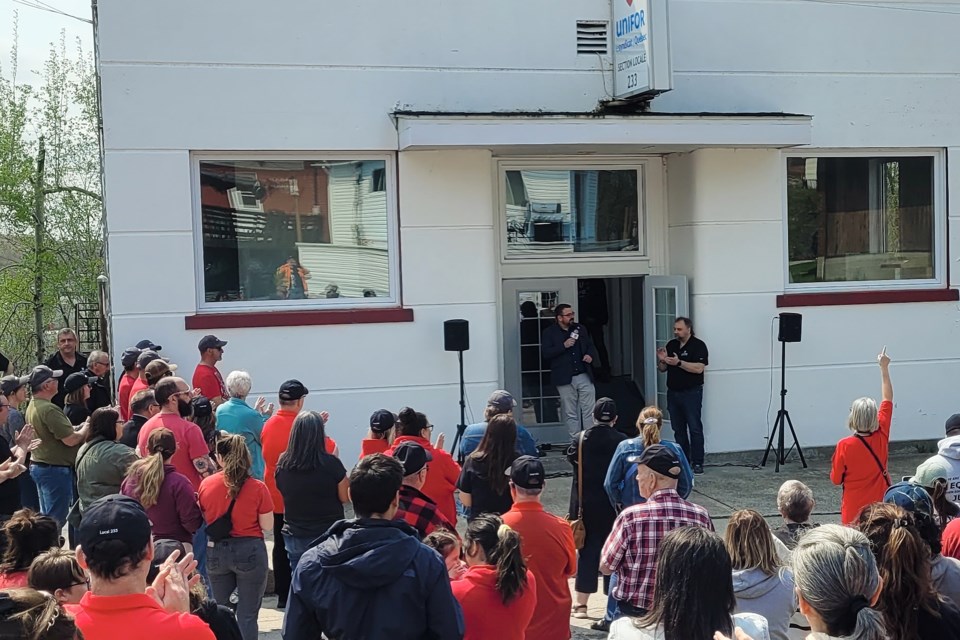“There’ve been no updates at all,” explained Stéphane Lefebvre, President of Unifor Local 233, which represents many of the 275 workers recently laid off from Rayonier Advanced Materials (RYAM), when the company announced it will suspend operations at the Temiscaming High Purity Cellulose plant.
“No updates,” Lefebvre reiterated, “and that’s the part that we find really inhumane.” However, he hopes for more answers soon, as representatives from the company are coming up from headquarters in Jacksonville, Florida, to meet with the union on May 21.
See: Temiscaming prepares for 'major impact' of RYAM layoffs
This morning, the union held a press conference at Unifor’s Union Hall at 35 Outlook Street. Hundreds of people filled the street outside the hall. Most of Ketchen Street, which Outlook loops onto, was filled with vehicles. Police directed traffic, and from about 10:30 onward, “There are no spots here,” was what they said to those cruising to park near the hall.
At 11 a.m., the union took the stage within the hall, but most of the assembled crowd remained on the street. Daniel Cloutier, Unifor Quebec Director, and Lefebvre spoke for about 30 minutes to an audience of about 60 within the hall.
Temiscaming’s mayor, Pierre Gingras attended, as did Chief Lisa Robinson of Wolf Lake First Nation and many others whose community is affected by the layoffs, which take effect on July 2.
“This entire region is going to be impacted by this decision,” Chief Robinson said. She’s been hearing from a lot of people about the announcement, “and people don’t know what to expect. It’s an uncertain time.”
Justin Roy, a councillor with Kebaowek First Nation, also came to show his support for workers. “A lot of our members have good-paying jobs because of RYAM, and we owe a lot to them for all of the jobs they have provided to our members for the past 50-plus years.”
“So, to see the mills closing down, and still not knowing today how many of our members will be losing jobs, is a big deal for all of us,” Roy added.
All of us not only referring to the neighbouring First Nations around Temiscaming, but the many businesses and mills that feed the operations at RYAM. Previously, Mayor Gingras said “The forest industry is in peril,” with operations ceasing at the Béarn sawmill located one hour from the town. Last September, Espanola lost Domtar, a major producer of pulp and paper.
See: Anxiety grips Espanola following pulp mill shutdown announcement
A troubling pattern is forming, “and the government isn’t doing enough,” Cloutier said. “We did not see any kind of press release from the government yet.” The plant “could run for years” to come he said, and he wants the government to help ensure it does. “We need somebody that would buy it with the real motivation to make it work,” he added, “and in that aspect, government could be useful” in attracting an operator.
“I’m really concerned now,” Wayne Gagne admitted, “but don’t underestimate Témiscaming.” Gagne is just six months shy of a 50-year career at the mill. “This town does band together.”
Cloutier agreed, sharing a similar message once he and Lefebvre returned to the streets. “When people stand together, when people fight together, we win,” Cloutier said to the cheering crowd.
“That’s what we’re going to do.”
David Briggs is a Local Journalism Initiative reporter who works out of BayToday, a publication of Village Media. The Local Journalism Initiative is funded by the Government of Canada.
